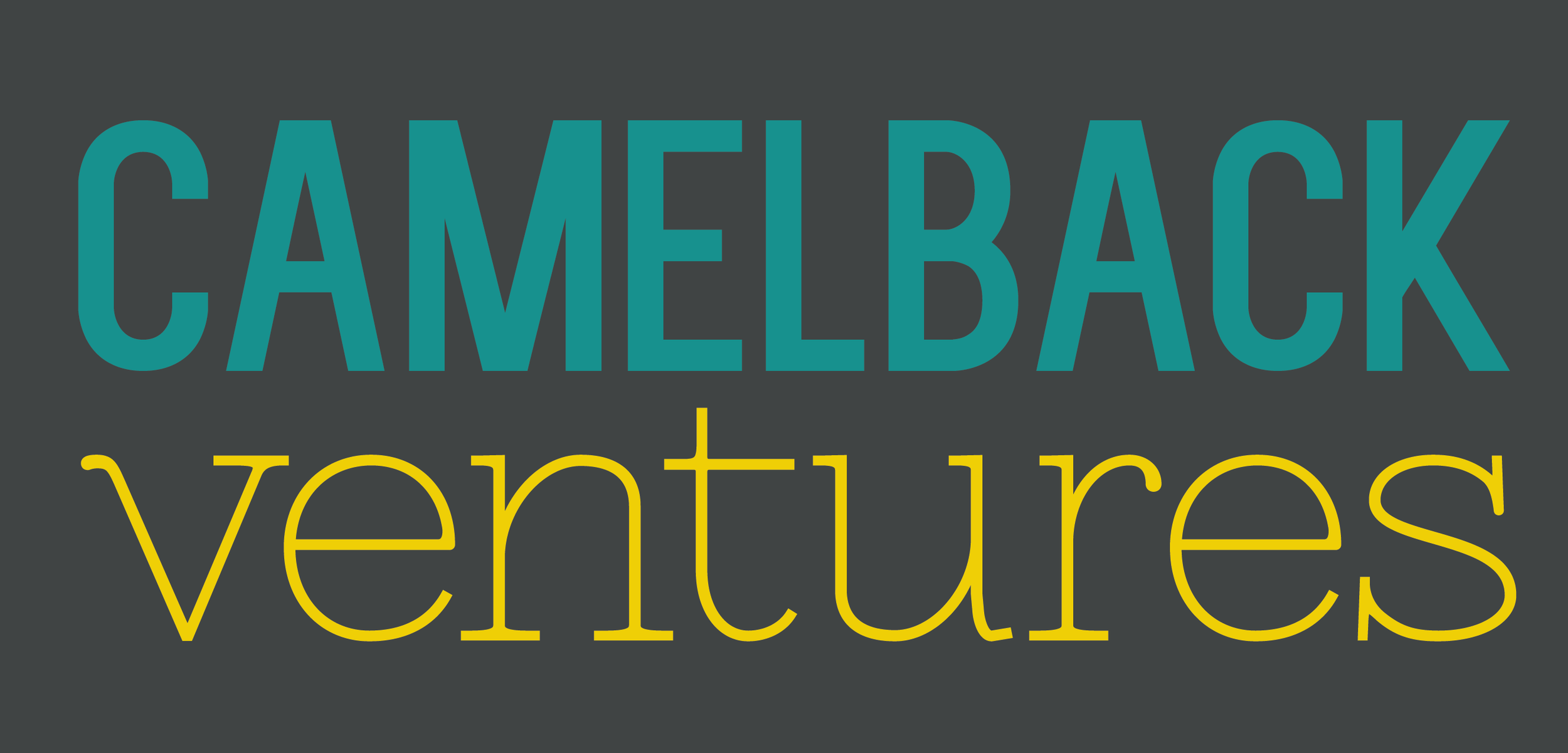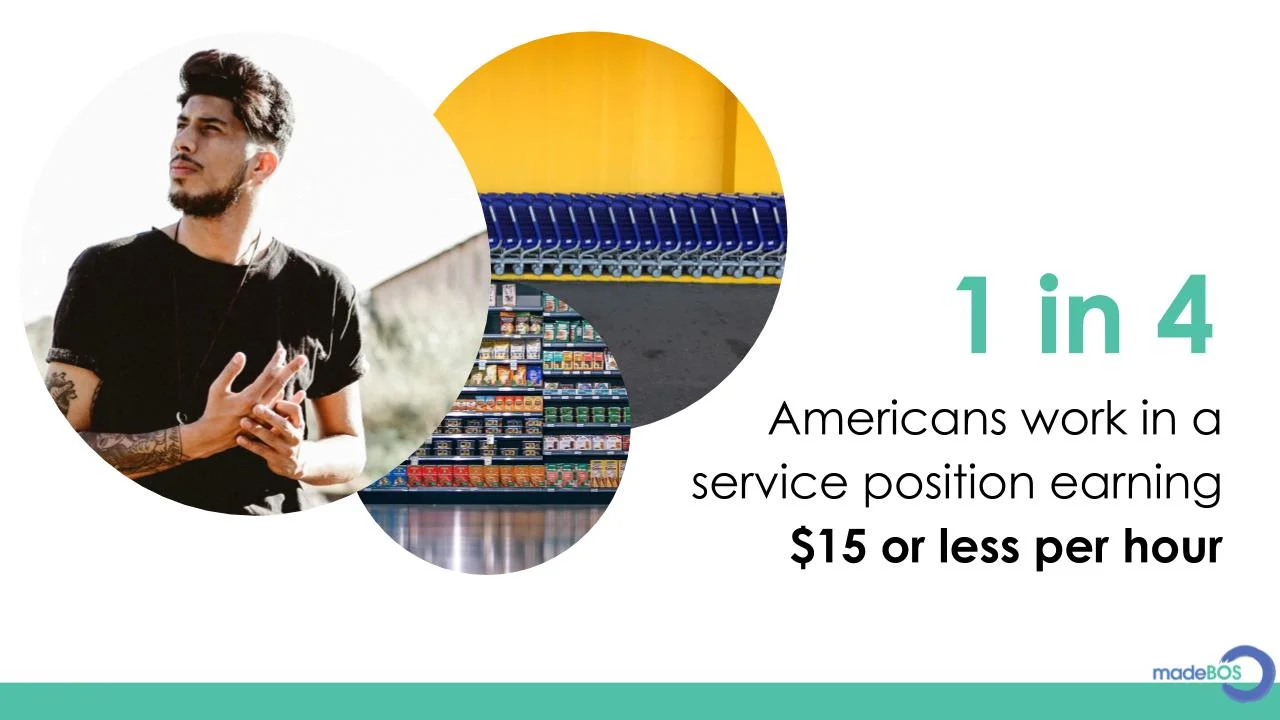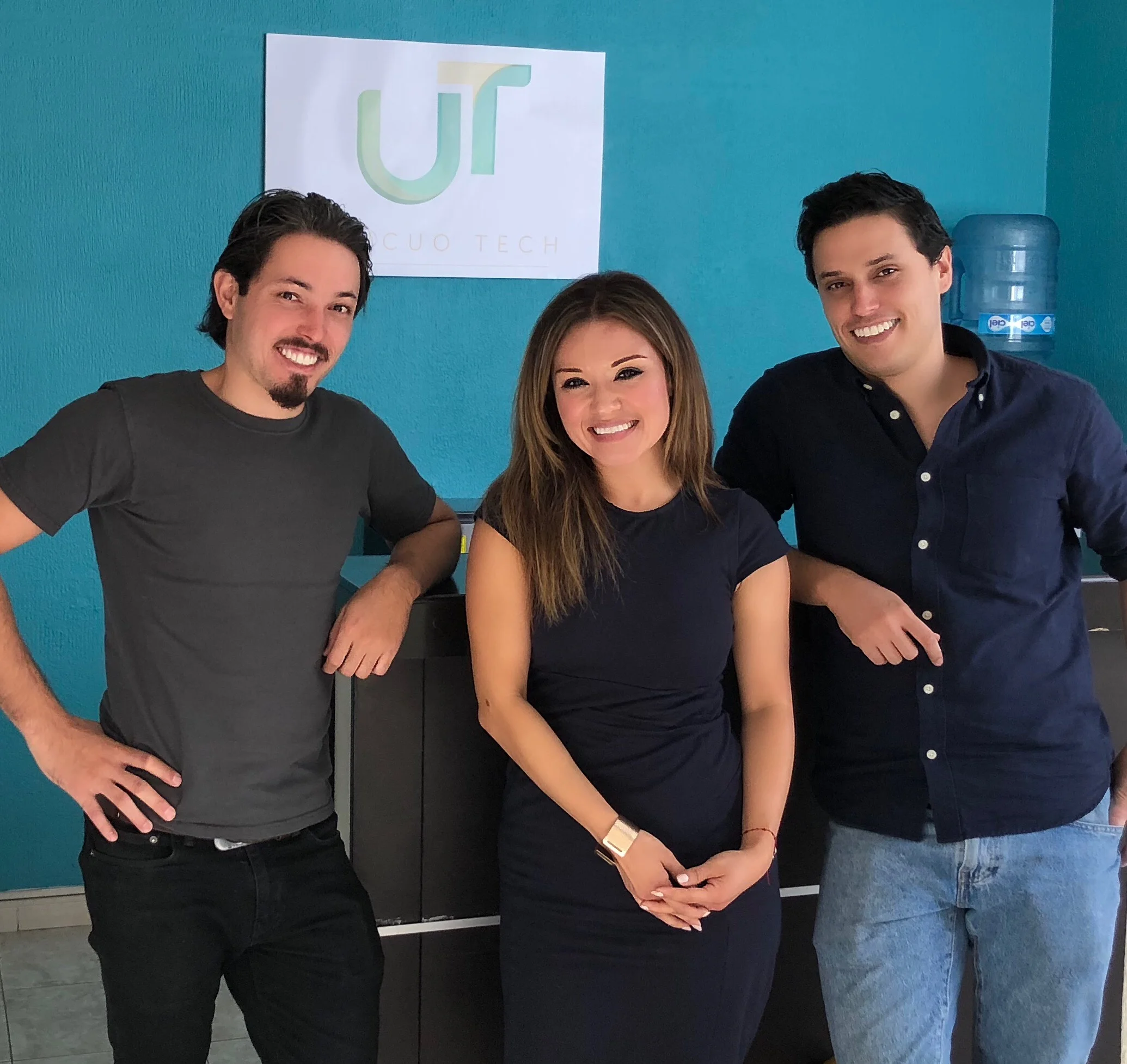Mexican Immigrants + Career AI = Unlocking Potential
Martha Hernandez is a 2018 Camelback Fellow, and this is her story of how she came to found madeBOS, her struggles and wins along the way, her drive for empowering her people, and how the Camelback Fellowship shaped her.
For the past two decades, I have worked in HR, specifically talent management. I love helping people become their best selves, and building strong teams that are more than just a collection of individuals. I did not start my career with the intention to start my own company and revolutionize the American workforce. I come from a Mexican immigrant family that was proud I had gone to college, proud I could support myself and others. My side passion was music, and the last thing I thought I wanted was to leave the comforts of corporate America to social entrepreneurship. This journey truly began a few years ago, when I was working for a few big box stores.
You might know that every company over 100 employees has to report to the Equal Opportunity Office on gender and ethnicity at all levels, amongst other factors. I was not required to look into the reports, but I felt it was my responsibility as an expert on employment to understand them. And what I saw there infuriated me. Across the board, minorities built the foundational entry level of work, with little to no representation in leadership roles. It was a system-wide problem across all industries.
I felt overwhelmed. I decided to focus my impact in one organization at a time, knowing change was only possible from within. But I kept hearing comments like, “Jose isn’t ready, Johnny isn’t ready.” Over and over again, the candidates they passed over were Mexican and Mexican Americans. I’d ask the managers to tell me more about why they would refuse.
“Well, you know they’re still learning. …And they love their job.” That response burned my insides. Because I knew that person. That person was my dad, my uncle, my friend, my sister. That person was someone who had gotten an MBA even while being a cashier and applied to seven different jobs internally, and never get the promotion. That was someone who had been working in the warehouse or in the fields for 10 years, who never even got a second look.
I remember being so excited that I was able to help one such young man move up and get a promotion to an office-role. When he applied, everyone laughed, “A cashier applying for a VP role?!” But I took the time to sit and talk with him, and I learned his background and saw his potential. I was thrilled when he got the job.
He died three months later. I went to his funeral, and his mother came up to me and told me that those were the best three months of his life — all he had wanted for so long was an office job where he felt he “mattered.” She thanked me.
I felt even more committed to see more like him, even as my work was becoming filled with moments of frustration, and I often was met with wrongdoing, hatred, and cruelty. A White man who was my senior screamed at me and pointed into my face; when I asked administration to look into, I was told to “grow a thicker skin.” What that really meant was that only some of us are expected to grow thicker skins. Every large company I saw was filled and fueled by inequities, and I felt it, both as a Mexican American employee myself and as an expert in talent management.
I knew I had to drive the kind of cultural and intellectual shift required to make progress, but I couldn’t impact wide-scale change especially as I was fighting the very same issues myself. I would have to do something different. And, without any background in it, I realized it would have to be tech. So I prepared and focused my career in driving and delivering tech implementations and integrations. I spent endless hours testing ideas and methods. I realized the solution would need to be very transparent and show people what it looks like from a 360 perspective. If there is a promotion opportunity, there can be no doubt about what’s next and what someone has to do to qualify. Clients would have to be shown the tactical and practical profitability through data, thereby taking away bias. The numbers would make it clear which candidates were qualified. People’s lives could change. Generational poverty disproportionately impacting people of color - particularly Latinos of Mexican descent - could change.
With no money, I quit my job. I began to work on madeBOS, an AI platform that would create smart career pathing solutions, helping organizations stop turnover waste and individuals build a life they were well paid for. I found an incredible tech co-founder, Juventino Mejía Jr, and convinced him to quit his job at Apple to join me.
Want to be a founder? I have this one piece of advice for anyone: prepare. Prepare emotionally, prepare physically, prepare financially. Do what you have to do right now and plan it out so that way you have all the resources and tools you need to make sure that when it gets tough, you’re ready. Prepare your family that this is going to be a hard, difficult road and that you need everyone to pitch in. I talked to my mom and my sisters; I had to tell them I wouldn’t have money to do all these little things — they still pitch in and help.
Most of all, prepare to be disappointed. I had heard people say this but I didn’t understand what it meant until it happened to me. At the beginning, everybody loved my idea. People made promises. My network wanted me to succeed, but when I followed up, nothing happened. I can’t tell you how many times I was so deeply disappointed. When it comes down to it, no one’s going to move the finger to make anything significant happen for you, unless they benefit personally — that’s reality. I remember one day I woke up and I thought, Wow. What if this is not the right idea? Maybe I should be building something else. What have I done, dragging my team with me?
And that was when everything changed. Because that bit of ego about me was gone — that sense of what I thought I could get people to invest in my idea was gone. The work became the focus. I realized I had to have some sort of value to get real traction.
Juventino and I raised funds in a crowdfunding campaign purely from our community (we raised 217% of our goal, the majority by first-time Latino investors), used that money to create an MVP, and we ran a pilot. The moment I truly knew we were on the right track was when I spoke to one of of our participants, who reminded me of that young man who had passed away:
“Every time I’m in front of a computer and looking for a job, I see so many job listings and it’s overwhelming. That’s not the worst part. The worst is that I don’t feel I’m good enough for anything I see. The first time using madeBOS, I felt for the first time I was a good fit for three careers (not even just “jobs”). And I learned how to actually get there. No one has ever told me how to get to a job like that.”
I felt so empowered, knowing that we were making a real difference in people’s lives, and not just for “my people” - Latinos and Latinas. madeBOS is made for all people, for anyone who has ever struggled to be seen and valued, and in this country, this often means all Black and Brown people, immigrants and their children, and rural Americans - who, by the way, often only have access to low-end jobs at corporate big box stores. Some people have told me, “Your app, it’s only for Latinos.” That comment tells me so much about their perspectives — they are unwilling to admit and to see the millions of people living in generational poverty, and what that hopelessness means for our entire country.
Shortly after conducting our pilot, I applied to Camelback Ventures. Coming from Silicon Valley, I had been in other programs, shadowed other people, been interviewed. An hour before my Camelback interview, I prepared to “do my hair” — literally undo my curls, flatten them, as I was used to doing for every other funder meeting. But something stopped me. I wondered, Can I really just be myself? And so I was. Juventino sat with me during my interview, off-camera, to support me. After I finished, he said, “Wow. There’s no doubt you’ll get it.” I was surprised and asked why he thought so. “Because of the synergy. There’s a common goal. This is what you’ve been looking for. They get it. They see you.”
“They see you.”
I’ve knocked on doors, hustled, shared my message, demonstrating my expertise. But in the Silicon Valley, that’s the base of what’s expected. But what Camelback saw in me was that I wasn’t everybody. They saw the distance I had traveled, what I had had to overcome, way beyond any other individual in the traditional funding route. When he said, “They see you,” I felt for the first time that it was me, all of me, that was valued. I felt it again at my first Summit as a Camelback Fellow. I felt that I had brought something that was truly important and valued by everyone at the team, and that people were truly excited and saw the full potential of what I wanted to create.
Entrepreneurship is difficult. So, so difficult. We sometimes make it more difficult for each other, our own communities, by having specific expectations or asking specific questions of ourselves. The Camelback team shared this message of accepting us, whether we were at one end of the spectrum or the other. Within our cohort, we had very diverse opinions and work, but I felt Camelback embraced that. I felt the learnings and workshops were designed in such a way to empower us all to make the choices and decisions we needed to for our own growth- and our organizations.
I remember Aaron saying, “We need the tree shakers, and we need the people that are waiting for the fruit to fall.” To me, that acceptance and inclusivity is so critical -- when we see that our success is collective, that if we can participate regardless of what side or angle we see things from with one common goal, we can change this country and the world. In this case, the goal as I see it: increase entrepreneurship for the betterment of our communities especially with education. We don’t all have to be asking for the money, giving the money, or telling people what to do with their money. That not only can we all have value in this space, but we can all do things differently and that varied approach and brilliance will make our impact that much wider and stronger. My perspective was totally changed.
And it was good that I was growing, because the challenges continued.
I had a great coach with Camelback who developed me with a holistic approach. He pushed me to deal with every aspect of my life in this work: the technical, the emotional, the personal. That included asking hard questions of myself. Some of the answers led to joy — I wanted to feel like a badass in my sales conversations, so I got a certification in business strategy in AI from MIT. Some decisions were harder — my co-founder Juventino and I had a hard conversation about the reality of funding. We both felt we didn’t want to jeopardize our mission of the work by accepting just any money from funders who wouldn’t support our vision. This led to one of the hardest choices we had to make: Juventino moved into an advisory role so he could get a full-time job to support his family.
This could have been devastating, but I chose to see it as an opportunity. I began to think about how we could continue to grow our tech. And that drove me to think, what assets do I have? Who is in my company already? How can the internal aspects of my organization do as much good as my product? Who wants to see me successful? Who NEEDS to see me successful? And that all came back to my own people — Mexican Americans.
In this nation alone, in the minority population OVERALL, the largest ethnic minority are of Hispanic and Latino descent— 52 million people. Latinos drive that number, and over 60% of Latinx immigrants come from Mexico. And the majority of those come from my home-state, Michoacán. This was a result of that state’s partnership with the U.S. starting in the 1940s, the Bracero Program -- recruitment for agricultural labor.
When I looked at these numbers, I felt so freaking empowered. I felt this intense responsibility, and that gave me strength. I had the numbers of the people behind me who had been hiding, who have been hid. Who have been working day in and day out, in poverty. People whose talents have been ignored, because their cheap labor was deemed more valuable. My people have been kept in this cycle in America for over 70 years, with anyone who pushed back threatened, deported, or silenced.
“People whose talents have been ignored, because their cheap labor was deemed more valuable.”
I learned that Mexico is the third IN THE WORLD in producing software engineers, though I had never heard of it before. But guess what? Very few are in leadership or entrepreneurship positions. For the most part, they are in a maquiladora role -- i.e. subcontractors, working for international dev shops, and mostly for other United States companies and often in low level coding work.
And what is my outcome for madeBOS? It’s UNLOCKING POTENTIAL. Regardless of where you’re at in your career or in the world, we want to unlock your potential and empower you to grow into the work and life that you want and deserve. I felt empowered again -- I realized I could use my power with my organization to not just create a mission-driven product, but could implement my passion and identity in my own practices by being intentional about who will continue to build our software.
So, I booked tickets and rented an office in Guadalajara, Jalisco Mexico during the first weeks of November. I had interviews lined up with local organizations such as Jalisconnect, Laboratoria and successfully partnered with two value aligned entrepreneurs at UbicuoTech to continue our software development and talent search. Similar to the standards in Silicon Valley, I am working on a plan to ensure our developers have a piece of the pie. We will all shake the tree, and we will all get the fruit.




